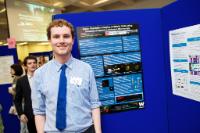2016 Participants
 Jonathan McHugh
Jonathan McHugh
All life starts out as a single cell, which, by the time the average human is fully grown, will increase to over 32,000,000,000,000 cells. To do this, cells must divide; replicating their DNA and content. Results can be catastrophic if this process goes wrong, and can result in diseases such as cancer or birth defects. In order to understand the complexity of cell division we must observe it using microscopy techniques. Super Resolution Light Microscopy allows us to see down to 250nm; 400 times thinner than a human hair.
STED (Simulated Emission Depletion), a new type of microscopy, allows us to see at a resolution of 60nm. Depending on the type of microscopy, different fluorescent tags need to be used to visualize the cell components.
The aim of this project was to maximize the potential uses the STED microscope by finding the ideal fluorescent tags and identifying optimum preparation conditions.
Funding source: Wellcome Trust
Supervisor: Dr Alex Laude
